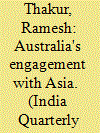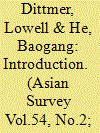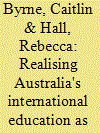|
|
|
Sort Order |
|
|
|
Items / Page
|
|
|
|
|
|
|
| Srl | Item |
| 1 |
ID:
038624


|
|
|
|
|
| Publication |
London, Collins, 1972.
|
| Description |
352p.: ill.Hbk
|
| Standard Number |
0002110016
|
|
|
|
|
|
|
|
|
|
|
|
Copies: C:1/I:0,R:0,Q:0
Circulation
| Accession# | Call# | Current Location | Status | Policy | Location |
| 010609 | 923.294/MIL 010609 | Main | On Shelf | General | |
|
|
|
|
| 2 |
ID:
128435


|
|
|
|
|
| Publication |
2013.
|
| Summary/Abstract |
The ebb and flow of coping with Australia's identity dilemma as a European settler society located on the geographical edge of Asia leads to bouts of agonising, excitement and temporising. This has been given particular cogency with the power shift underway from the trans-Atlantic to the Asia-Pacific. The 2012 White Paper set 25 national objectives to be met by 2025, with targets ranging from improving trade links and increasing scholarships to teaching priority Asian languages. But in this transactional embrace of Asia that highlights economic and trade links, gaps might open up between ambition and delivery, especially amidst continuing evidence of insensitivity to how Asians forge lasting relationships. Ties with China are dominated by trade but security concerns remain. Relations with India should improve with the removal of the nuclear issue as an irritant and growing trade and tourist numbers. Japan remains an important trade and diplomatic partner. And geography and demography ensure that Indonesia is no less important to Australia than Asia's big three.
|
|
|
|
|
|
|
|
|
|
|
|
|
|
|
|
| 3 |
ID:
130162


|
|
|
|
|
| Publication |
2014.
|
| Summary/Abstract |
IN THE PAST 20 YEARS, CHINA HAS RISEN to become the second largest economic power in the world. Its GDP surpassed that of Canada in 1993, Italy in 2000, France in 2005, the U.K. in 2006, Germany in 2008, and Japan in 2009. In 2012 it surpassed the United States as the world's largest trading nation (the U.S. remains the largest importer). China is now the number one trading partner of Australia, Japan, South Korea, and the ?rst or second trading partner of the 10 nations in the Association of Southeast Asian Nations (ASEAN), not counting the EU. Growing economic dependence upon China, however, raises long-term security issues for all Asian trade partners, given their strategic proximity to ambitious China. This is also true for Australia, just 200 kilometers from Indonesia at their closest points. Canberra, unable to shore up a security guarantee from Beijing, has increased its purchase in the security insurance policies of Washington.
|
|
|
|
|
|
|
|
|
|
|
|
|
|
|
|
| 4 |
ID:
127063


|
|
|
|
|
| Publication |
2013.
|
| Summary/Abstract |
Australia's international education serves as public diplomacy, essentially engaging and influencing public audiences in ways that progress Australian foreign policy priorities and national interests. The multidimensional and increasingly globalised nature of international education presents enormous opportunity for vital exchange and interactions between and with students, academics and communities via onshore and offshore modes of delivery. Positive experiences of student mobility and the development of intellectual, commercial and social relationships can build upon a nation's reputation, and enhance the ability of that nation to participate in and influence regional or global outcomes. This is ultimately the essence of soft power. While Australia has made significant commercial gains through international education, it has fallen short of realising the soft power potential inherent in the volume and depth of interactions, relationships and achievements resulting from it, particularly in the Asian region, where Australia's international education sector continues to be most active. This article argues that there is a soft power benefit in recognising international education as public diplomacy, though acknowledges that challenges exist in connecting the soft power aspirations to reality. Findings suggest that there is room for more coherent public diplomacy leadership and inter-agency coordination, improved evaluation and expanded dialogue both within the sector and the broader community.
|
|
|
|
|
|
|
|
|
|
|
|
|
|
|
|
|
|
|
|
|